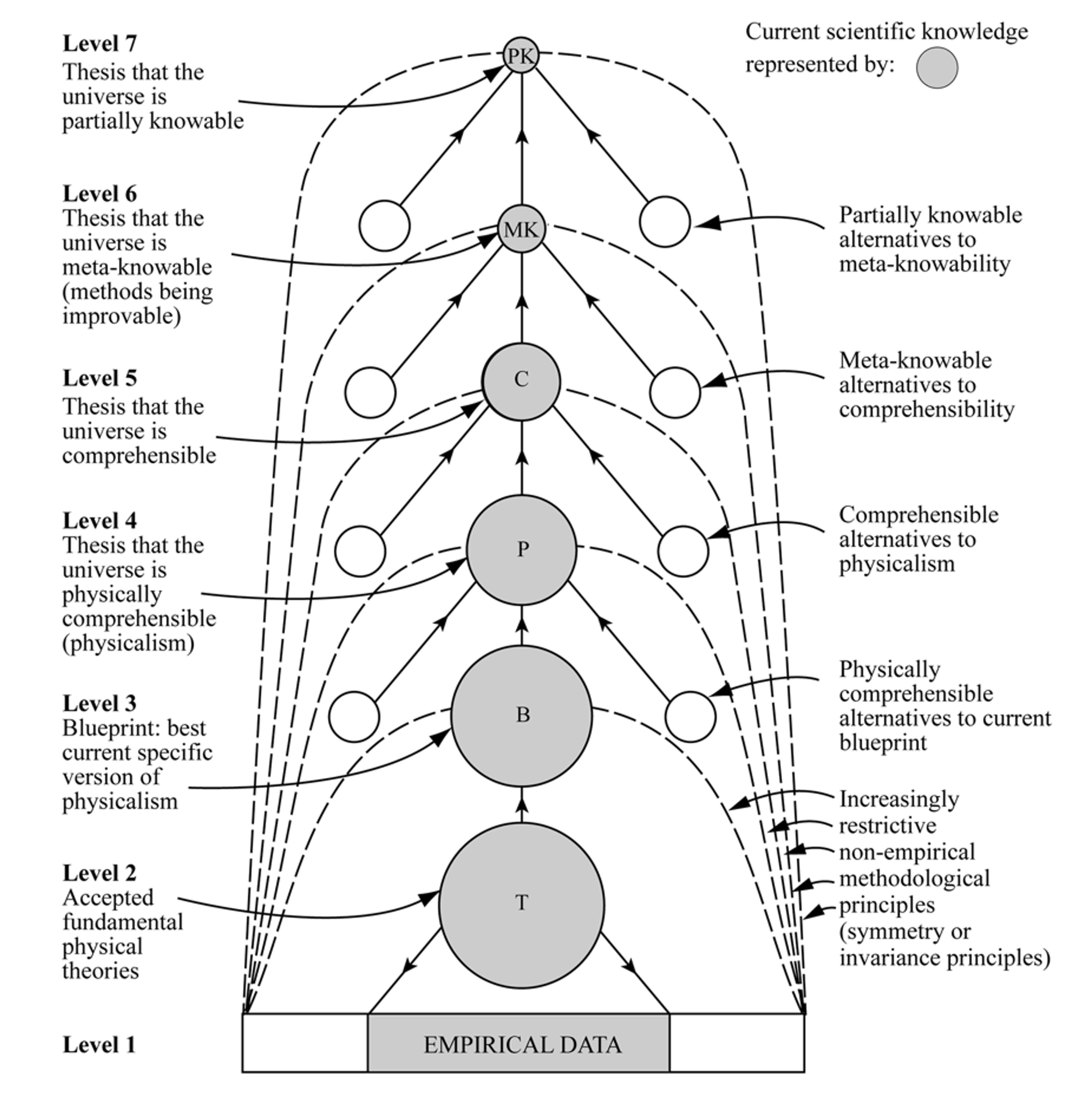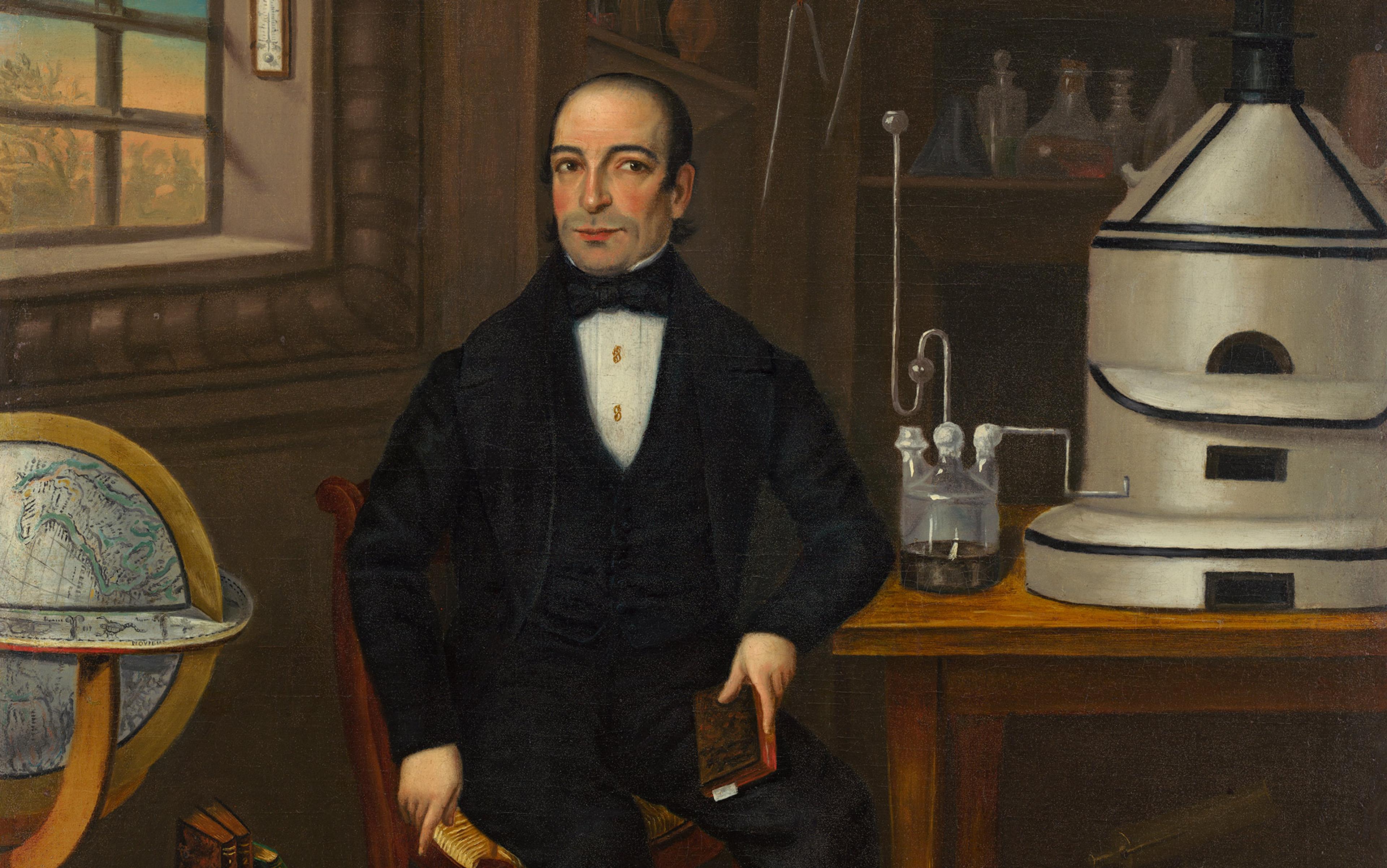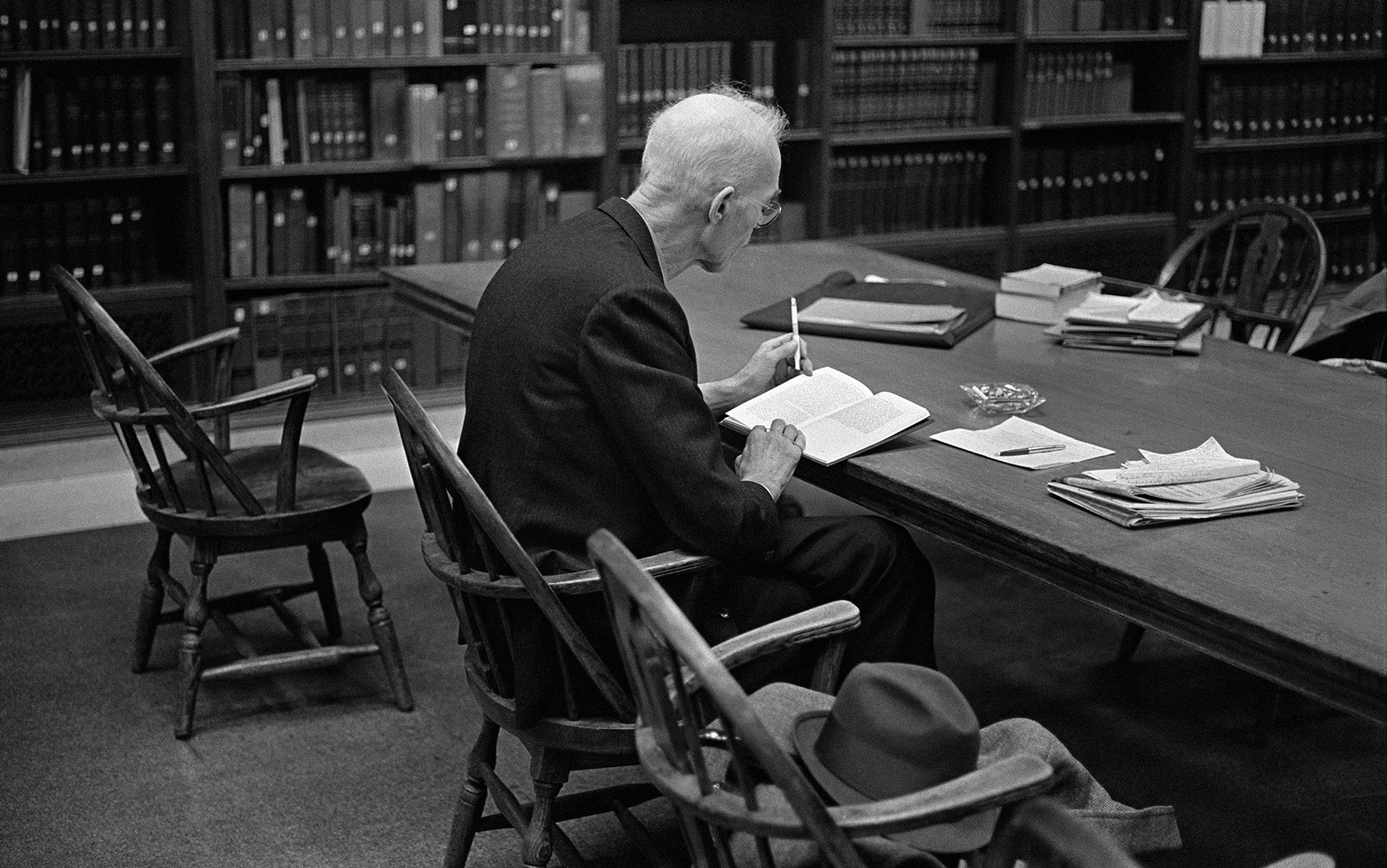There are decisive grounds for holding that we need to bring about a revolution in philosophy, a revolution in science, and then put the two together again to create a modern version of natural philosophy.
Once upon a time, it was not just that philosophy was a part of science; rather, science was a branch of philosophy. We need to remember that modern science began as natural philosophy – a development of philosophy, an admixture of philosophy and science. Today, we think of Galileo, Johannes Kepler, William Harvey, Robert Boyle, Christiaan Huygens, Robert Hooke, Edmond Halley and, of course, Isaac Newton as trailblazing scientists, while we think of Francis Bacon, René Descartes, Thomas Hobbes, John Locke, Baruch Spinoza and Gottfried Leibniz as philosophers. That division is, however, something we impose on the past. It is profoundly anachronistic.
At the time, they would all have thought of themselves as natural philosophers. All were prepared to think about fundamental problems of metaphysics and philosophy in addition to tackling more specialised problems of physics, astronomy, chemistry, physiology, mathematics, mechanics and technology. Philosophy as imaginative and critical thinking about fundamental problems was alive and well – and highly creative and productive. Both Kepler and Galileo made careful observations and performed experiments, as good scientists should; but they also adopted a metaphysical view of nature that held that ‘the book of nature is written in the language of mathematics’ as Galileo put it. They both adopted the view, in sharp contrast to the orthodox Aristotelian metaphysics of the times, that simple mathematical laws govern the way that natural phenomena occur, and this metaphysical view played a crucial role in the discovery and acceptance of their great scientific discoveries concerning the motions of the planets (Kepler), and the motion of terrestrial objects (Galileo). Descartes, Huygens, Boyle, Newton and others adopted diverse versions of the then metaphysical view that the Universe is made up of atoms.
But then science broke away from metaphysics, from philosophy, as a result of natural philosophers adopting a profound misconception about the nature of science. As a result, natural philosophy died, the great divide between science and philosophy was born, and the decline of philosophy began.
It was Newton who inadvertently killed off natural philosophy with his claim, in the third edition of his Principia, to have derived his law of gravitation from the phenomena by induction.
Paradoxically, the first edition of Newton’s Principia (1687) was quite explicitly a great work of natural philosophy. There are, in the first edition, nine propositions all clearly labelled as ‘hypotheses’, some quite clearly of a metaphysical character. By the third edition (1726), the first two of these hypotheses had become the first two ‘Rules of Reasoning’, and the last five hypotheses, which concern the solar system, had become the ‘Phenomena’ of later editions. One hypothesis disappears altogether, and one other, not required for the main argument, was tucked away among theorems. In the third edition there are two further ‘rules of reasoning’, both inductive in character. In connection with the second of these, Newton comments: ‘This rule we must follow, that the argument for induction may not be evaded by hypotheses.’ And he adds the following remarks concerning induction and hypotheses:
whatever is not deduced from the phenomena is to be called an hypothesis; and hypotheses, whether metaphysical or physical … have no place in experimental philosophy. In this philosophy, particular propositions are inferred from the phenomena, and afterwards rendered general by induction. Thus it was that … the laws of motion and of gravitation were discovered.
In these and other ways, Newton sought to transform his great work in natural philosophy into a work of inductive science.
Newton hated controversy. He knew his law of gravitation was profoundly controversial, so he doctored subsequent editions of his Principia to hide the hypothetical, metaphysical and natural philosophy elements of the work, and make it seem that the law of gravitation had been derived, entirely uncontroversially, from the phenomena by induction. Because of Newton’s immense prestige, especially after his work was taken up by the French Enlightenment, subsequent natural philosophers took it for granted that success required that they proceed in accordance with Newton’s methodology. Laws and theories had to be arrived at, or at least established, by means of induction from phenomena. Metaphysics and philosophy had become irrelevant, and could be ignored. Thus was modern science born, and natural philosophy, which had given rise to modern science in the first place, was quietly forgotten.
Newton’s inductivist methodology is still with us. It is known today as ‘inference to the best explanation’. (Newton did not ignore explanation. His Rules of Reasoning stressed that induction required one to accept that theory which is simplest and, in effect, gives the best explanation of phenomena.) Scientists today might not hold that theories can be ‘deduced’ from phenomena by induction, but they do hold that evidence alone (plus explanatory considerations) decides what theories are accepted and rejected in science. In other words, they take for granted one or other version of standard empiricism, the doctrine that evidence decides in science what theories are to be accepted and rejected, with the simplicity, unity or explanatory power of theories playing a role as well, but not in such a way that the world, or the phenomena, are assumed to be simple, unified or comprehensible. The crucial point, inherited from Newton, is that no thesis about the world can be accepted as a part of scientific knowledge independently of evidence, let alone in violation of evidence. In essence, Newton’s methodology of evidence and theory still dominates the scene. The decisive split between science and philosophy, which is one outcome, persists today.
Philosophy was profoundly impoverished as a result of this split. Instead of science being a branch of philosophy – namely natural philosophy – science became distinct from and independent of philosophy. Philosophy lost a great chunk of its body, as it were, and by far the most successful chunk to boot.
Divorced from natural science, philosophy continued to dwindle in significance down to today. Psychology, anthropology, sociology, economics, political science, linguistics, logic and cosmology all broke away from philosophy and established themselves as independent disciplines. By the early 20th century, philosophy was in a state of crisis. It was entirely unclear what was left for it to do. One attempted solution was Continental philosophy, conducted mainly in Europe: it could ignore science, ignore reason, and plunge into a celebration of bombast and incoherence. Another attempted solution was analytic philosophy, conducted mainly in the English-speaking parts of the world: philosophy could devote itself to conceptual analysis, serious problems buried under a sheen of esoteric, spurious analysis of concepts.
But all this is unnecessary and absurd. The story I have told of the inevitable dwindling of philosophy, as components became, in turn, scientific, successful and independent, is a nonsense. The proper task of philosophy, even more important today, perhaps, than ever before, is to keep alive rational – that is, imaginative and critical – thinking about our most urgent and fundamental problems of thought and life. It is, above all, to keep alive such thinking about our most fundamental problem of all, which can be put like this: how can our human world, the world as it appears to us, the world we live in and see, touch, hear and smell, the world of living things, people, consciousness, free will, meaning and value – how can all of this exist and best flourish embedded as it is in the physical Universe?
This fundamental problem straddles all the more specialised and particular problems of both thought and life. A proper, basic task for philosophy is to ensure that this problem is actively explored at the heart of education and academic enquiry, so that rational thinking about this problem both influences, and is influenced by, the more specialised thinking that goes on in the more specialised disciplines of the natural, social and technological and formal sciences, the humanities and education, and the more particular contexts of personal, social and global life.
Keep alive rational thinking about fundamental problems as specialisation becomes rampant
Far from having its own distinctive subject matter, problems or methods, philosophy, properly conducted, has the subject matter and problems, potentially, of all the specialised disciplines, and the methods of all of enquiry, namely the methods of rational problemsolving. Far from being yet another specialised discipline, distinct from and alongside other specialised disciplines, as so much academic philosophy strives to be today, philosophy, properly pursued has, as a basic task, to counteract specialisation by keeping alive thinking about fundamental problems in a way that interacts, in both directions, with specialised research. Again, philosophy properly pursued, is not the exclusive preserve of qualified philosophers; a basic proper task for professional philosophers is to encourage everyone to engage in some philosophy, some rational thinking about fundamental problems: non-academics as well as academics from the diverse specialised fields of academic research.
We need a name for philosophy pursued in this spirit. Let us call it Critical Fundamentalism – a rival to Continental and analytic philosophy. Critical Fundamentalism goes a long way towards recreating natural philosophy, for Critical Fundamentalism explores the fundamental problems of the diverse fields of natural science, from theoretical physics and cosmology, to neuroscience and evolutionary biology. Critical Fundamentalism, conducted in a scientifically enlightened way, would both influence, and be influenced by, scientific research. It would have the capacity to contribute to science by clarifying fundamental scientific problems and suggesting possible scientific solutions; and it would of course be influenced by the results of scientific research. This two-way integration of Critical Fundamentalist philosophy and science would amount, in all but name, to natural philosophy!
The above story about the inevitable decline of philosophy is thus a nonsense. The successful establishment and pursuit of the natural sciences, the social sciences, logic and linguistics does not impoverish philosophy, properly pursued as Critical Fundamentalism, at all. The vital need for rational (imaginative and critical) thinking about fundamental problems remains undiminished. It is needed so that science, and so that academic enquiry as a whole, can meet elementary requirements of rationality. (Rationality demands that one keeps alive thinking about the fundamental problems one seeks to solve.) The self-mutilation of philosophy by the adoption of Continental philosophy or analytic philosophy – which results in philosophy failing to do what it most needs to do – is entirely unnecessary.
Why, then, did it happen? In part, perhaps, because of a failure to appreciate just how vital, how necessary, it is to keep alive influential rational thinking about fundamental problems, especially as specialisation becomes more and more rampant. Instead of seeking to counteract the evils of rampant specialisation, academic philosophy has tended, in the 20th century, to seek out eagerly, even desperately, its own specialised niche.
There is, however, a far more important reason for the failure of philosophy to keep alive the spirit of Critical Fundamentalism over the decades and centuries. This failure stems from the failure of philosophy to solve one of its most fundamental problems: the problem of induction.
I began by indicating how Newton killed off natural philosophy with his false claim, in the third edition of his Principia, to have derived his law of gravitation from the phenomena by induction without appealing to metaphysical hypotheses. Subsequent natural philosophers concluded that they must follow Newton in ignoring metaphysics and philosophy, and attending only to evidence in considering what laws and theories should be accepted and rejected. The outcome was science, decisively dissociated from philosophy. And Newton’s conception of science is still taken for granted by scientists today. The crucial tenet of this conception is that, in science, no thesis about the Universe must be accepted as a part of scientific knowledge independent of evidence, let alone in violation of evidence. In the end it is evidence that decides what is accepted as scientific knowledge.
But this Newtonian conception of science bequeathed to philosophy a fundamental problem about the nature of science that, for most philosophers, remains unsolved down to today. It is the problem of induction, brilliantly articulated by David Hume in A Treatise of Human Nature (1739), see Book 1, Part III. It can be put like this. However much evidence we gather in support of a law or theory, it cannot verify the law or theory, or even render its probability greater than zero. This is because any physical law or theory makes infinitely many predictions, not just about the past and present, but about the future too, and possible states of affairs that have not, as yet, occurred (and might never occur). We must always be infinitely far away from verifying all these infinitely many predictions of the theory.
Put another way, however well-established a theory is by evidence, there will always be infinitely different theories that agree about the evidence we have gathered so far, but disagree, in different ways, about predictions for phenomena that we have not yet observed, because they are in the future, or because they concern possible states of affairs or experiments not yet created. For example, if the accepted theory is Newton’s law of gravitation, one rival, up till now just as empirically successful as Newton’s theory, might assert: everything occurs as Newton’s theory predicts until 2050, when gravitation abruptly becomes a repulsive force. Another such rival might assert: everything occurs as Newton’s theory predicts except for gold spheres in outer space over 1,000 tons in mass that attract each other in accordance with an inverse cube law (instead of the inverse square law of Newton’s theory). These rivals are horribly disunified, and somewhat implausible: they are, however, for the moment, just as empirically successful as Newton’s theory. We can even concoct endlessly many disunified rivals to Newton’s theory that are even more empirically successful by adding on to Newton’s theory additional, independently testable hypotheses whose predictions have been verified.
Physics makes a big, highly problematic assumption about the nature of the Universe
Evidence cannot verify a theory. It cannot even select a theory – since infinitely many disunified rivals will always fit the available evidence equally well, or even better. (A theory is disunified – to degree N – if it makes N different assertions about the actual and possible phenomena to which it applies; it is unified if N = 1: for further details see here.)
This famous problem – Hume’s problem of induction – in effect decisively refutes the Newtonian conception of science, still accepted by the scientific community today.
One attempt at rescuing Newton’s conception of science from Hume’s refutation goes like this. Science, in deciding what theory to accept or reject, attends not just to evidence, but to two considerations: (1) evidence, and (2) the simplicity, unity or explanatory character of the theory in question. This view has the great merit of doing better justice to what actually goes on in science. The empirically successful but horribly disunified versions of Newtonian theory, just considered, are ruled out.
But there is still a problem. If physics, in particular, persistently accepts unified theories only, even though endlessly many disunified rivals are available that fit the available facts just as well, or even better, this must mean, whether it is acknowledged or not, that physics makes a big, highly problematic assumption about the nature of the Universe. It means that physics makes the big assumption: the Universe is such that all disunified theories are false. There is some kind of underlying unity in nature. This assumption is implicitly accepted as a part of scientific knowledge since theories that conflict with it – those that are disunified – are rejected (or not even considered) whatever their empirical success might be. This assumption of underlying unity is, however, accepted independently of evidence, even in a sense in violation of evidence (in that it clashes with endlessly many disunified theories even more empirically successful than the theories we accept). That contradicts what I have called ‘the Newtonian conception of science’, standard empiricism.
The conclusion is inescapable: science cannot proceed without making, implicitly or explicitly, a persistent metaphysical assumption of unity – ‘metaphysical’ because it is too imprecise to be verified or falsified by evidence. The current orthodox conception of science, inherited from Newton, and still taken for granted by scientists today, that science must appeal only to evidence, and must not make metaphysical assumptions about the nature of the universe independently of evidence, is untenable, and must be rejected.
What do we put in its place? In order to answer that question, it is vital to appreciate that the specific version of the metaphysical assumption of unity, accepted by physics at any stage in its development, exercises a profound influence over both the search for new theories and the acceptance of existing theories. And yet this assumption is a pure conjecture, the specific version of which, accepted at any given time, is almost bound to be false – as the historical record indicates (in that metaphysical ideas, from corpuscular to string theory, have changed radically a number of times since the 17th century). The new kind of science we require explicitly acknowledges the existence of this substantial, influential and highly problematic metaphysical assumption of unity, and subjects it to sustained scrutiny, alternatives being developed and criticised, in an attempt to improve the specific version of the assumption that is accepted.
Aim-oriented empiricism, as I have called this new conception of science, represents the metaphysical assumption in the form of a hierarchy of assumptions. As we go up this hierarchy, assumptions become less and less substantial, and so more and more likely to be true, and more and more nearly such that their truth is required for science, or the pursuit of knowledge to be possible at all. In this way, we create a framework of assumptions (and associated methods) high up in the hierarchy, very likely to be true, within which much more substantial assumptions (and associated methods) low down in the hierarchy can be critically assessed and, we might hope, improved.

Fig 1. Aim-orientated empiricism.
At the top of the hierarchy, we have the assumption that the Universe is partially knowable; it is such that we can continue to acquire knowledge of our local circumstances sufficient to make life possible. If this assumption is false, we have had it, whatever we assume. It cannot harm and might well help the search for knowledge to make this assumption, whatever the Universe is like. Even though we have no reason to suppose the assumption true, nevertheless we are justified, on narrowly pragmatic grounds, in accepting this assumption as a part of our scientific knowledge.
Next down in the hierarchy is the assumption that the Universe is meta-knowable; it is such that we can formulate a conjecture about it that is true, and such that accepting the conjecture makes it possible for us, as we improve our knowledge, to improve methods for the improvement of knowledge. The Universe is such, in other words, that there can be something like positive feedback between improving knowledge, and improving knowledge about how to improve knowledge.
Successive theories in physics have brought ever-greater unity to ever-wider ranges of phenomena
Next down there is the assumption that the Universe is comprehensible in some way or other. There is something, inherent in all phenomena, that is responsible for the way that events occur, in terms of which everything can, in principle, be explained and understood. This ubiquitous something might be God, or a cosmic purpose (one that all events occur in order to fulfil), or a unified pattern of physical law. Granted meta-knowability, comprehensibility is a good assumption to adopt since, if true, it makes it possible for us to hone in on that version of comprehensibility that leads to the greatest success in improving knowledge. We put forward various sorts of explanatory theories; if one sort proves to meet with particular empirical success, meta-knowability justifies us in concentrating on theories that are explanatory in this particular sort of way.
Next down is the assumption that the Universe is physically comprehensible; a unified pattern of physical law runs through all phenomena, in terms of which all physical phenomena can, in principle, be explained and understood. This assumption of physical comprehensibility has played an astonishingly fruitful role in science ever since Galileo. Successive theories in physics have brought ever-greater unity to ever-wider ranges of phenomena. This is true of Newtonian theory, Maxwellian electrodynamics, Albert Einstein’s theories of special and general relativity, the quantum theories of Werner Heisenberg, Erwin Schrödinger, Paul Dirac, Abdus Salam, Steven Weinberg and others. Granted meta-knowability we are, in these circumstances, justified in accepting physical comprehensibility (until something better turns up).
Next down in the hierarchy of assumptions we have that specific version of physical comprehensibility that does the best justice to current theoretical knowledge in physics, and gives the best promise of future progress. This assumption can, today, be said to be string theory: everything is made up of tiny quantum strings in 10- or 11-dimensional spacetime.
Next down we have our best accepted fundamental theories of physics – at present general relativity and the so-called standard model (the quantum field theory of fundamental particles and the forces between them). And next down, at the bottom of the hierarchy, we have empirical phenomena – low-level empirical laws established by experiment.
This hierarchy of assumptions and associated methods facilitates the improvement of metaphysical presuppositions of physics, in part by concentrating imaginative exploration and critical scrutiny where it is most likely to be fruitful for scientific progress, low down in the hierarchy of assumptions. It does so also by ensuring that new possible assumptions, worth considering, low down in the hierarchy, are fruitfully constrained, partly by assumptions higher up in the hierarchy, partly by physical theories that have met with the greatest empirical success. Those metaphysical assumptions, low down in the hierarchy, are chosen that stimulate, or are associated with, the most empirically progressive research programmes in physics, or hold out the greatest hope of that. In these ways, the hierarchical framework of aim-oriented empiricism facilitates improvement in metaphysical theses that are accepted low down in the hierarchy, but are most likely to be false.
As theoretical knowledge in physics improves, metaphysical presuppositions improve, and even lead the way. There is something like positive feedback between improving metaphysical assumptions and associated methods, and improving theoretical knowledge in physics. As we improve our scientific knowledge and understanding about the Universe, we correspondingly improve the nature of science itself. We improve methods for the improvement of scientific knowledge. For further details concerning aim-oriented empiricism, see my book The Comprehensibility of the Universe (1998); my research paper ‘Has Science Established that the Cosmos is Physically Comprehensible?’ (2013); and my books Understanding Scientific Progress (2017), In Praise of Natural Philosophy (2017) and Karl Popper, Science and Enlightenment (2017), the last of which is free to download.
We can learn from scientific progress how to achieve social progress
The outcome is natural philosophy, a synthesis of physics and metaphysics, science and philosophy. Metaphysics, methodology, even epistemology, traditionally subjects of philosophy, have become an integral, fruitful part of science. The Critical Fundamentalist conception of philosophy is massively endorsed. Within the framework of aim-oriented empiricist natural philosophy, science has almost become a specialised part of philosophy! The divorce between science and philosophy, so harmful for the latter, is at an end. Philosophy has a fruitful, indeed vital, role to play for science; some of its problems are at the leading edge of scientific research. And as a bonus, aim-oriented empiricist natural philosophy does what Newtonian science cannot do; it solves Hume’s problem of induction: see my book Understanding Scientific Progress.
There are further, even more important implications. Aim-oriented empiricism can be generalised, to form a conception of rationality – aim-oriented rationality – that is fruitfully applicable to any worthwhile human endeavour with problematic aims. All too often in life – personal, social, institutional, global – the real aims of our actions are problematic, either because they conflict with other desirable aims, or because they are unrealisable, or both. This is all too apparent in connection with the profoundly problematic aim of humanity to attain a good, civilised world. All too many past efforts to create civilisation, whether of the Left or Right, have produced exactly the opposite, various kinds of hell on Earth. Here, above all, we need to put aim-oriented rationality into practice, arrived at by generalising the progress-achieving methods of aim-oriented empiricism.
We need to represent the aim of civilisation in the form of a hierarchy of aims, these becoming less and less specific, and so less and less problematic, as we go up the hierarchy. In this way, we provide ourselves with a framework of relatively unproblematic aims and methods (high up in the hierarchy) within which much more specific, problematic and controversial aims, and associated methods (low down in the hierarchy), can be improved as we act, as we live. We can, in short, learn from scientific progress how to achieve social progress towards a good, civilised world.
As a result of getting progress-achieving methods generalised from those of science, into social life, we can begin to achieve real social progress towards a civilised world akin, to some extent, to the intellectual progress achieved by science. There would be some hope that we can begin to solve the grave global problems that threaten our future: climate change, destruction of the natural world, population growth, the menace of nuclear weapons, and the rest. So vital is this task of tackling our problems exploiting aim-oriented rationality that we urgently need all the resources of universities to help us learn how to do it. Academia needs to be transformed so that its basic task becomes to help humanity resolve those conflicts and problems of living that need to be solved if we are to make progress towards a genuinely civilised world.






